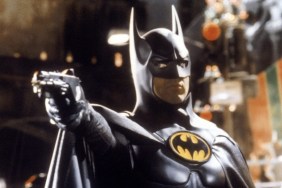Michael Caine is 78 years old. For 48 of those years, he has been a bona fide movie star. He’s got 155 acting credits on IMDb alone, and two Oscars with his name engraved upon them. The handsome Londoner, born Maurice Micklewhite in 1933, is one of the most recognizable faces in film history, and boasts an iconic cockney twang that exudes authority and, at least until he was playing grandfathers, an undeniable sex appeal. And still he ends up in movies like Journey 2: The Mysterious Island.
There was a time when Caine admitted that he’d make any film for the money alone. In regards to the reviled Jaws: The Revenge, he’s been quoted as saying, “I have never seen the film, but by all accounts it was terrible. However I have seen the house that it built, and it is terrific.” But despite frequent crapburgers like the killer bee epic The Swarm, the thoroughly unnecessary sequel Beyond the Poseidon Adventure and the preachy Steven Seagal vehicle On Deadly Ground, Caine has nevertheless contributed fabulous performances in enough movies to make narrowing down this week’s edition of Five Great Movies a real bitch of a job.
We think we’ve got a good crop here, but as always we’re not claiming these are the best Michael Caine movies, just some great ones. Did we leave out your favorites? Let us know in the comments!
Zulu (dir. Cy Endfield, 1964)

Michael Caine’s first starring role, or at least co-starring, remains one of his best films. Not many actors can make that claim, but then not many actors can say they got their start in a movie like Zulu. The film was directed by Cy Endfield, a blacklisted filmmaker whose previous film, funnily enough, was a 1961 adaptation of Jules Verne’s The Mysterious Island. He co-wrote and directed Zulu as a starring vehicle for Stanley Baker, who co-produced, but Caine’s performance led to big roles very quickly, and he soon became one of the most recognizable British stars in the world.
The film is based on a true story about The Battle of Rorke’s Drift, in which Zulu warriors in South Africa besieged a regiment of the English army for two solid days in 1879. Baker stars as Lieutenant John Chard, who assumes command over the hopelessly outnumbered regiment – consisting largely of wounded soldiers – when Lieutenant Gonville Bromhead (Caine) seems unwilling to cooperate. Today the plot seems a little by the numbers – establish the threat, establish the ensemble cast, plan the attack, watch the attack, hope everyone gets out okay – and fans of contemporary films like 300 and The Lord of the Rings: The Two Towers will probably notice parallels between those films and Zulu. They’ll also notice that Zulu did it just as well, if not better, than practically any siege picture before or since, thanks to a fantastic cast of British character actors and exciting direction from Endfield that captures the chaos of the battle whilst keeping the actual events of the film clear in every single scene. It’s bravura adventure filmmaking that works just as well today as it did in 1964.
Gambit (dir. Ronald Neame, 1966)

Michael Caine’s performance in Zulu earned him some high profile gigs in the years that followed, including his first appearance as the spy Harry Palmer in The Ipcress File and the starring role in the comedy Alfie, which earned him his first Oscar nomination. But unsung amongst his early films, at least for now, is the delightful crime caper Gambit, co-starring Shirley MacLaine and Robert Lom. I say “for now” because the film is currently being remade by director Michael Hoffman (Restoration), starring Colin Firth, Cameron Diaz and Alan Rickman in the same roles. If you’re worried about that, you probably shouldn’t be: the screenplay’s been written by The Coen Bros.
Gambit, directed by Ronald Neame (who would go on to direct the original The Poseidon Adventure), stars Michael Caine as a thief with a brilliant, intricate plan to steal a rare antiquity from the millionaire Ahmad Shahbandar, played by Robert Lom. The film opens quickly as Caine outlines the plan in full, with MacLaine appearing as his willing patsy and everything going off without a hitch. In fact, the story moves so quickly that you’ll start to wonder how long the film could possibly be, until he finishes his explanation and walks over to MacLaine, who immediately screws everything up. In fact, every single neatly orchestrated machination goes horribly wrong as Caine discovers that his scheme is the kind of thing that only works in the movies. Shahbandar is not the eccentric kook Caine assumed he’d be, MacLaine is not the easily manipulated stooge he’d hoped for, and security systems can actually change. Before long Caine is running around with a hangdog look on his face, frantically trying to stick to the plan even though chaos theory – and hilarity – is in full effect. Caine has never been funnier and MacLaine was rarely this charming. It’s a little hard to find, but Gambit is a forgotten comedy classic worth searching for.
The Italian Job (dir. Peter Collinson, 1969)

Caine appeared in another classic heist caper – this time universally acknowledged – in 1969 with The Italian Job, generally considered one of his greatest films and we are in no mood to argue. The eccentric crime saga stars Michael Caine as Charlie Croker, a career criminal recently released from prison, who plans to pull off a massive heist, in broad daylight, in the middle of a crowd, with a team of misfits at his command, played by the likes of Tony Beckley and comedy legend Benny Hill.
The plot of The Italian Job is rich but not terribly complicated. Caine plans the heist, Caine executes the heist, Caine gets in one of the most iconic car chases ever put on film (a merry romp through Italy in Mini Coopers zooming through, under and on top of everything in sight). It’s the unexpected details and gauche style that makes The Italian Job such a unique treat. Caine gets out of jail and right into an orgy. He has to break back into jail to organize the job with a crime lord played by the great Noël Coward. The classic line, “You were only supposed to blow the bloody doors off!” The Italian Job exudes 1960s style in a way that feels fresh and sexy, not dated and camp. And it ends with an unexpected cliffhanger that’s bound to confound the audience as much as the film’s aggravated cast. The Italian Job was remade in 2003 with an all-star cast that included Mark Wahlberg, Ed Norton, Jason Statham and Donald Sutherland, and it’s actually a rather fun film, but it can’t hold a candle to the original.
Get Carter (dir. Mike Hodges, 1971)

One of Michael Caine’s darkest films to date is Mike Hodges’ classic British gangster film Get Carter, which stars Caine as criminal out to avenge the murder of his brother. The film was Hodges’ first film as a director, but he went on to make such films as the Clive Owen noirs Croupier and I’ll Sleep When I’m Dead, and also the camp classic Flash Gordon. Weird career, that guy has.
Caine turns down the cockney charm as Carter, a gangster who returns to his hometown after his brother died in an apparent drunk driving accident. The truth is much more complicated, and takes Carter from amusement parks to amateur porn rings as he exacts soulless revenge against those who wronged his family. Critics were not kind to Get Carter at first, condemning the film for its callous attitudes towards violence and immorality, but the film rapidly gained a reputation as one of the best British films ever made due to its assured direction, smart plotting and Caine’s atypically brutal performance as criminal who won’t let being on the right side stop him from being a total d*ckhead. Get Carter was remade in 2000 with Sylvester Stallone in the lead and Michael Caine in a supporting role. Nobody really likes that version. Watch the original to see why it could never hold up.
Dirty Rotten Scoundrels (dir. Frank Oz, 1988)

More lighthearted fun then! Michael Caine’s dodgy period – he made an awful lot of crap in the 1980s – was punctuated by one of his funniest films, Dirty Rotten Scoundrels, based on the 1964 David Niven and Marlon Brando comedy Bedtime Story. The film was directed by Frank Oz, whose credits include the musical version of Little Shop of Horrors, the hilarious In & Out and also The Muppets Take Manhattan, which co-starred Oz as the voice of Miss Piggy. The film was quite a hit, thanks to the witty script and affable chemistry between Caine and his co-star Steve Martin.
Michael Caine stars as Lawrence Jamieson, a high-class con man operating in the French Riviera who meets the small-time American grifter Freddy Benson, played by Steve Martin, and uses his influence to usher Freddy out of town. But Freddy’s no fool, he just plays one all the time. Freddy convinces Lawrence to take him on as an apprentice, leading to a particularly hilarious sequence in which Martin pretends to be his dimwitted brother, but before long their differences lead to a wager. Whoever bilks the kindhearted Janet Colgate (Glenn Headly, never better or sexier) out of $50,000 can stay in the French Riviera to practice their art, whoever loses can never return. What follows is a smart and extremely funny comedy of improvisation, as Freddy pretends to be a paraplegic and Caine pretends to be a doctor specializing in his exact condition. Classic slapstick and witty barbs can be found in just about every scene, and although the film’s twists and turns may be a little obvious to fans of this kind of material, Caine and Martin are a perfect comedic pairing who bring out the best in each other as actors. You’ve probably seen (and loved) it already, but if you haven’t you owe it yourself to fix that immediately.
That’s it for Five Great Movies this week. Come back next Wednesday for more of our picks, and by all means, leave us a list of your favorites below!





